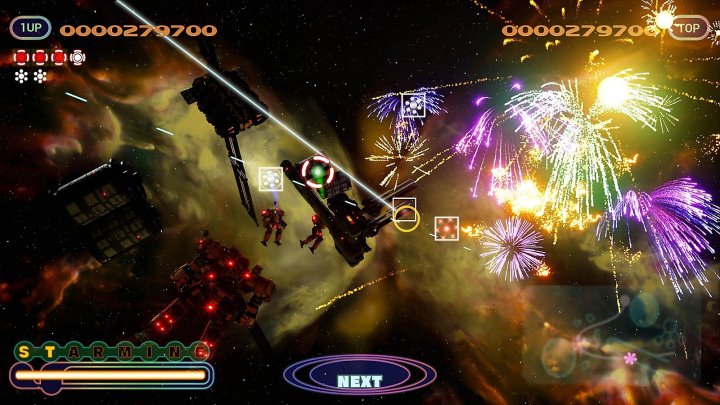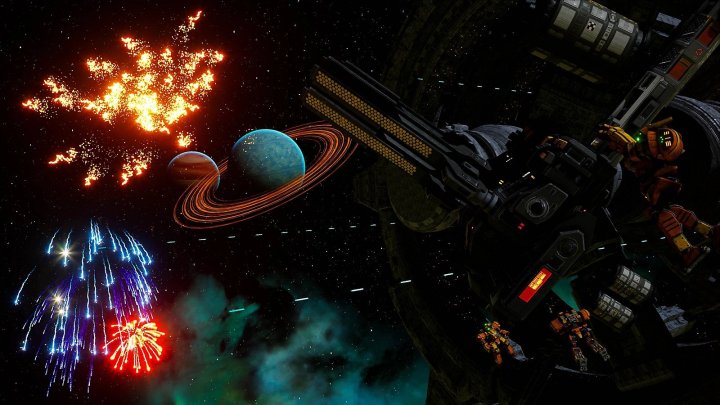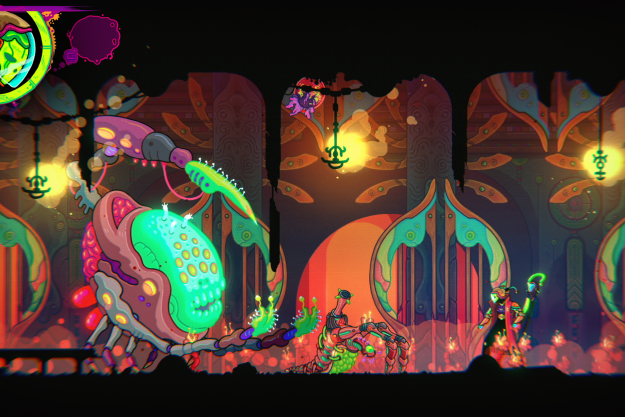With the PlayStation VR2 out now, all eyes are on Horizon Call of the Mountain. The action-adventure title is Sony’s first big exclusive for the platform, acting as its tentpole launch title. While it’s a must-buy for anyone picking up the device on day one, it’s more successful as a strong technical showcase for the headset rather than as a fun game that stands on its own. If you’re looking for the latter, you’ll want to check out PSVR2’s real hidden weapon: Fantavision 202X.
Developed and published by Cosmo Machia, Fantavision 202X is a completely left-field sequel to an obscure PlayStation 2 launch game. Like the original, it’s a unique fireworks game that plays like a cross between Missile Command and a match-three puzzler. There was nothing like it when it first released in 2000, and frankly, there still isn’t in 2023. That makes the new version feel as fresh, creative, and weird as ever.
What stands out most about Fantavision 202X, though, is how much it’s quietly enhanced by VR. Cosmo Machia has taken a somewhat average puzzle game and made the best version of it without changing much at all. It’s a prime example of what kinds of games thrive in VR, standing in bright contrast to more ambitious projects that have struggled to replicate a full-on console experience in a headset.
Never break the chain
Fantavision 202X isn’t so much an evolution of its predecessor as it is a VR remake. It’s a level-based puzzle game where players have to match colorful flares as they shoot up into the night sky and detonate them to create a fireworks display. Match three flares of the same color up, press a button to set them off, and watch them light up a city skyline. That’s just the basic rules, though. Advanced strategies require players to create massive flare chains by looping a new color with neutral “wild” flares and items. Explosions will set off flares of the same color too, so there’s a lot of extra strategy in when to detonate, as that can keep a chain going.

It’s the definition of an “easy to learn, hard to master” game. When I first played the PS2 version, I understood the basic matching system, but couldn’t fully grasp its “daisy chain” system. The sequel includes a set of very clear tutorials that have significantly improved my skill. There’s an immense satisfaction that comes from getting a combo over 100 or detonating an enormous chain that lights up the entire screen. I’ve already found myself chasing its Platinum trophy as I work toward its various milestones.
The new version is almost identical to the original, from its eight-stage single-player setup to its virtually unchanged gameplay. Even its simple visuals are a bit of a throwback to the PS2 era. Fantavision 202X can be played without a headset, but you’d get pretty much the exact same experience that way as you would simply playing the original on PlayStation Plus. Its $30 price tag seems a little high considering how slim the package is.
However, it’s a completely different experience in VR. When playing on a TV, flares are connected by moving the joysticks around, which always felt a little stilted in the original. Controls are much more natural with PSVR2, as players can freely move their hands with the Sense controllers to highlight colors. That tactile element is enough to entirely change the psychology of the core Fantavision experience. When I’m in my flow state, I feel like a conductor crafting a visual symphony with my own hands.

While the visuals aren’t terribly detailed, that’s another area where the tech is a natural fit. Each stage takes place over a skyline that the camera slowly moves through on rails. Early levels take players on a guided tour over a city, but levels quickly get a little weirder as the fireworks show moves to outer space. VR makes those spaces much more immersive, as I actually feel like I’m flying through the night rather than following a camera panning through a background.
And of course, the firework display itself turns into a spectacle in 2D space. When I trigger a Starmine bonus round, colorful explosions shoot out right in front of my eyes. I can see individual strands zipping past me, putting me in the actual center of the show. That level of depth was never possible on a flat TV, but the experience is much more dynamic here; it feels like Fantavision was always meant to be a VR game.
Right game, right tech
With its sparse feature set, Fantavision 202X is a modest package. However, it’s a shining example of what kinds of games truly work in VR. The arcade nature of it makes it easy to play in short sessions, as it doesn’t demand that players stay strapped into a tight headset too long. Gameplay is easy to execute with motion controls, and its slow-moving levels won’t leave you running for a barf bag. It’s an ideal VR game in just about every way.

Contrast that with Horizon Call of the Mountain, which tries to cram a full-on PlayStation game into a headset. It’s a fun experience, but one that can be sloppy at times. Its tactile climbing is a highlight, focusing on natural hand movements, but its more complicated systems can be a headache. Its fast-paced combat is especially a struggle, as messy controller tracking can make it difficult to dodge, swap weapons, craft ammo, and more on the fly. During most of my playthrough, I was thinking more about the tech than the world I was in as I had to constantly tweak my calibration settings to get it right. When I’m playing Fantavision 202X, I’m not thinking about the tech at all.
It seems like Sony wants to find a way to recreate its brand of cinematic action-adventure games in VR, but it still feels a little early for that. While VR has had a lot of success with more involved experiences, we’re still in the Nintendo 64 era of the tech at best. Rather than trying to squeeze a modern game into a headset, Fantavision 202X proves that there’s value in embracing the tech’s current limitations. A return to the PS2 era is exactly the kind of evolution VR was ready for.
Fantavision 202X is available now on PlayStation 5. It can be played with or without PSVR2.
Editors' Recommendations
- I was a PlayStation Portal hater. Now it’s one of my go-to gaming devices
- You need to try PlayStation VR2’s most psychedelic game yet
- One year later, my PlayStation VR2 is collecting dust
- PlayStation State of Play, January 2024: How to watch and what to expect
- VR gaming lost me in 2023, and then totally won me back




